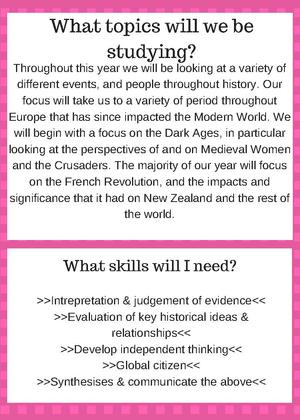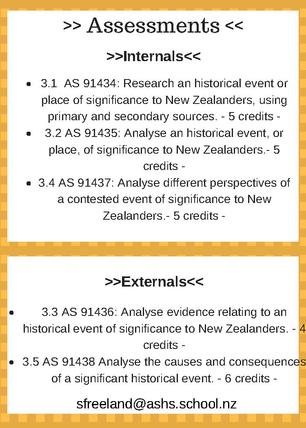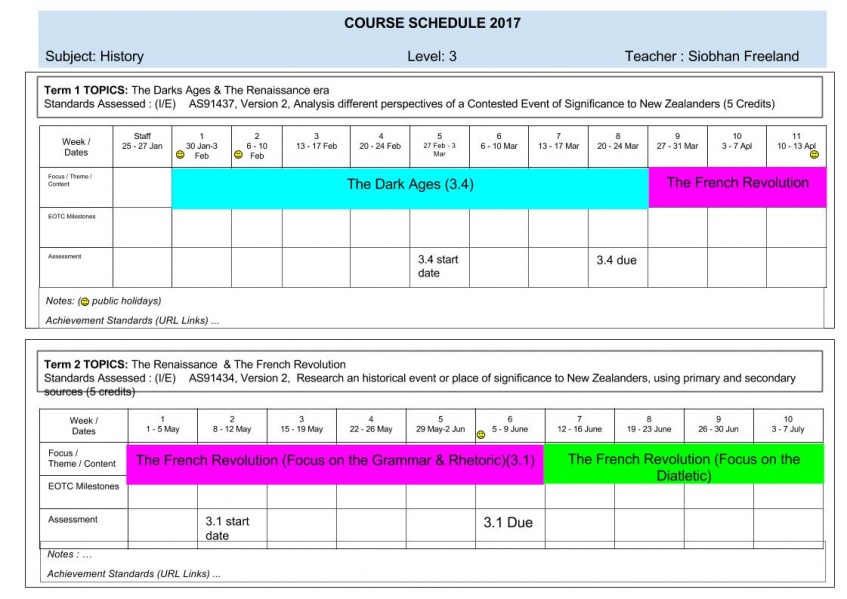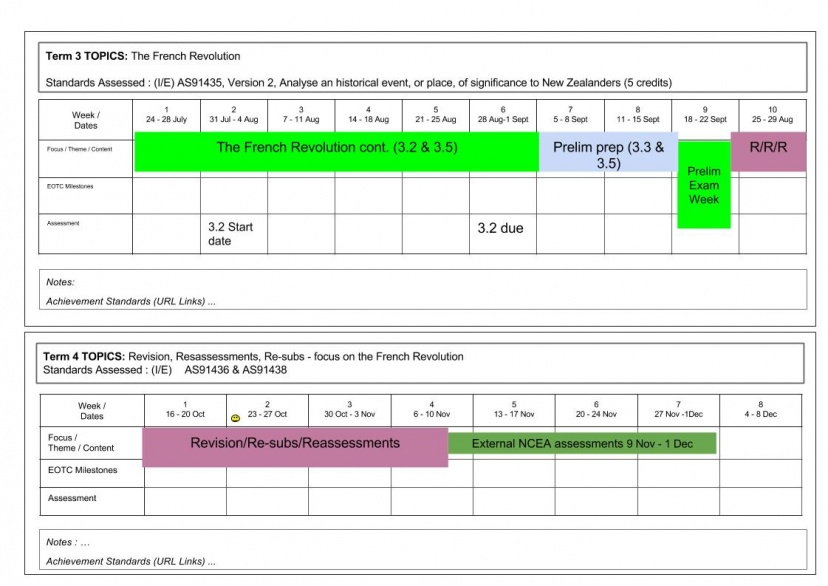Albany Senior High School/Coursebook/3HIS
Contents
Level 3 History
History examines the past to understand the present. It involves looking at the complex and contested nature of the past through examining causes, consequences, trends, forces, and explanations. The essence of history is the judgement of worldly affairs and history will help you develop a range of essential skills: the ability to interpret and critically analyse a wide range of evidence; to communicate your thoughts with clarity and purpose; to research and synthesize information; and to engage in debate and discussion on the significance of the past and present.History is a University Entrance Approved Subject
History if a University of Auckland Table
What will I learn about?
Topic 1: The Dark Ages
Our focus throughout this unit will be looking at the idea of whether or not the Dark Ages, actually deserved their title of being called the Dark Ages. We will be examining both the in detail the European Crusades, along with the role of medieval woman during this time period.
Topic 2: The French Revolution
The last topic examines one of the key founding events of modern society: The French Revolution. We examine the origins of the revolution from the peak of French monarchy under Louis XIV (the Old Regime) to the eventual beheading by guillotine of Louis XVI. We will also examine the legacy of the Revolution including the key ideas of political liberty and human rights, as well as political terror and the rise and fall of Napoleon Bonaparte.
What Standards can I enter?
| NCEA Level |
Standard Number |
Name of Standard |
Version Number |
Credits | Reading | Writing | Assessment |
|---|---|---|---|---|---|---|---|
| Level 3 | AS91434 | 3.4: Research an historical event or place of significance to New Zealanders, using primary and secondary sources. | Version 2 | 5 Credits | Yes | No | Internal |
| Level 3 | AS91435 | 3.2: Analyse an historical event, or place, of significance to New Zealanders. | Version 2 | 5 Credits | Yes | No | Internal |
| Level 3 | AS91437 | 3.4: Analyse different perspectives of a contested event of significance to New Zealanders. | Version 2 | 5 Credits | Yes | No | Internal |
| Level 3 | AS91436 | 3.3: Analyse evidence relating to an historical event of significance to New Zealanders | Version 2 | 4 Credits | Yes | Yes | External |
| Level 3 | AS91438 | 3.5: Analyse the causes and consequences of a significant historical event. | Version 2 | 6 Credits | Yes | Yes | External |
Vocational Pathways provide a framework for students to show how their learning and achievement is valued in the workplace by aligning learning to the skills needed for industry. Follow this link to see the profile for this course.
Scholarship History
In scholarship history students use knowledge of history to establish valid judgements about the nature of evidence and communicate a substantiated argument that critically evaluates historical narratives, establishes historical relationships, synthesises relevant ideas and demonstrates an understanding of the scope of historical contexts.
Performance at a scholarship level includes a high level of:
• analysis and critical thinking
• integration, synthesis, and application of highly developed knowledge, skills, and understanding to complex situations
• logical development, precision and clarity of ideas.
Outstanding performance at scholarship level requires a sustained level of:
• perception and insight
• sophisticated integration and abstraction
• independent reflection and extrapolation
• convincing communication.
The scholarship examinations include a resource booklet of 10-15 primary and secondary sources on one specific historical context. There will be a question and answer booklet with two questions. Candidates choose one of these questions to answer and they are expected to use the sources in the resource booklet and also draw on their own knowledge. You will be required to evaluate the evidence of the sources and produce a single piece of writing.
You must demonstrate your ability to:
• analyse and think critically about key ideas relevant to the historical context and setting
• evaluate historical relationships such as cause and effect, continuity and change, past and present, specific and general, patterns and trends
• judge the reliability and usefulness of historical evidence and evaluate the strengths and limitations of historians’ narratives
• use highly developed knowledge, historical ideas and skills to develop an argument which demonstrates an understanding of a complex historical context(s) and setting(s)
• communicate a substantiated and balanced argument within an effective written format including an introduction, conclusion, and structured paragraphs that are organised around a focused argument, a detailed knowledge of chronology and accurate supporting evidence to the context(s) and setting(s).
Frequently Asked Questions
Do I need to have studied history before? No. Many students have successfully picked history up before. It would be advantageous if you had a strong background in either English or a social science subject. If you are really interested in history, you should follow your interests.
Is there lots of writing? At level 3, you are required to present your information 'as an historian'. This is typically writing, but could include a conference presentation or a history-based webs
Welcome to History!
If you have any questions, contact Siobhan Freeland sfreeland@ashs.school.nz



